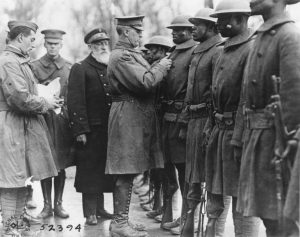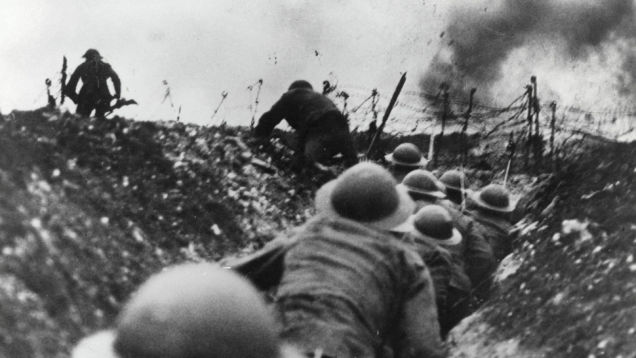Van Hollen, Blunt Announce New Bill to Honor WWI Minority Veterans
WASHINGTON – Today, U.S. Senators Chris Van Hollen (D-Md.) and Roy Blunt (R-Mo.) announced the World War I Valor Medals Review Act, new bipartisan legislation that will ensure that minority Veterans who served during WWI get the recognition they deserve. It would require the Department of Defense to undertake a review of valor medals awarded to minority Veterans during WWI to determine whether any should receive the Medal of Honor. This review would be conducted in consultation with the WWI Centennial Commission’s Valor Medals Review Task Force. Senators Tammy Duckworth (D-Ill.), Tim Scott (R-S.C.), and Richard Blumenthal (D-Conn.) are original cosponsors of the Senate bill, and Congressman French Hill (R-Ark.) has introduced the House companion legislation.
Servicemembers of all races, religions, and backgrounds fought in WWI, but the Medal of Honor was patently denied to minority Veterans until the 1990s. Congress has authorized more recent reviews for minority servicemembers from World War II to the present, but the only review undertaken for WWI took place in 1919 – and no minority Veterans received the Medal of Honor as a result of that review. Righting this historical wrong is long overdue.

“Hundreds of thousands of minority Veterans served their country during World War I, and their sacrifice was essential to our victory. But for far too long, their heroism has not received the recognition it deserves,” said Senator Van Hollen. “Take William Butler, an African American Veteran from Salisbury, for example. His valor was recognized with the Croix de Guerre with Palm, the Distinguished Service Cross, and a recommendation for the Medal of Honor – but he never received that medal before his death. His story is the exact kind of case the Valor Medal Task Force should review. This legislation will ensure he and countless others have the opportunity to be honored.”
“Minority veterans who exhibited the highest acts of valor during WWI deserve to be recognized with the Medal of Honor,” said Senator Blunt. “We cannot erase the discrimination minority service members faced, but we can make sure their heroic deeds are acknowledged and honored. I’m grateful for the work the Valor Medals Review Task Force, in partnership with Park University, is doing to make sure those who were denied the Medal of Honor because of their race or religion finally receive the recognition they have earned.”
A group of 20 organizations that represent millions of members of the uniformed services and their families wrote a letter in support of the legislation, saying, “Our organizations – through the efforts of the Valor Medals Review Task Force – support the fair adjudication of our highest military award for all, which must include our diverse population of service members who have exhibited the commensurate level of courage, sacrifice, and patriotism equal to others who were not denied such recognition. We stand with the Task Force in a common belief that the Medal of Honor should be considered without racial, ethnic, or religious bias.” The legislation is also endorsed by the Veterans of Foreign Wars, American Legion, American GI Forum, and Congressional Black Caucus Veteran’s Braintrust.
The legislation would require the Department of Defense to review the service records of African American, Asian American, Hispanic American, Jewish American, and Native American war veterans who were awarded the Distinguished Service Cross or Navy Cross, or who received a recommendation for the Medal of Honor for an action that occurred between April 6, 1917, and November 11, 1918. It would also require a review of the service record of veterans awarded the Croix de Guerre with Palm by the Government of France. This review would be conducted in coordination with the Valor Medals Review Task Force, which will raise private funds to complete the project. The bill authorizes the Secretaries of the Army and Navy to recommend veterans determined to merit the Medal of Honor as a result of the review to the President. It also waives statutory time limits which would preclude such a recommendation being made.

